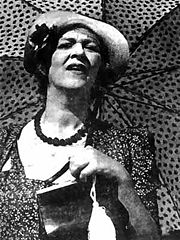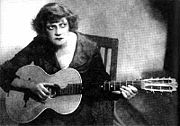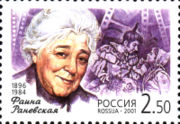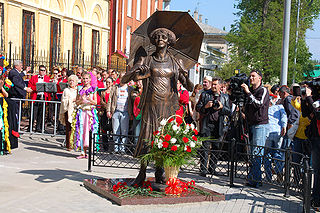
Faina Ranevskaya
Encyclopedia

Aphorism
An aphorism is an original thought, spoken or written in a laconic and memorable form.The term was first used in the Aphorisms of Hippocrates...
s.
She acted in plays by Anton Chekhov
Anton Chekhov
Anton Pavlovich Chekhov was a Russian physician, dramatist and author who is considered to be among the greatest writers of short stories in history. His career as a dramatist produced four classics and his best short stories are held in high esteem by writers and critics...
, Aleksandr Ostrovsky, Maxim Gorky
Maxim Gorky
Alexei Maximovich Peshkov , primarily known as Maxim Gorky , was a Russian and Soviet author, a founder of the Socialist Realism literary method and a political activist.-Early years:...
, Ivan Krylov
Ivan Krylov
Ivan Andreyevich Krylov is Russia's best known fabulist. While many of his earlier fables were loosely based on Aesop and Jean de La Fontaine, later fables were original work, often satirizing the incompetent bureaucracy that was stifling social progress in his time.-Life:Ivan Krylov was born in...
, Fyodor Dostoevsky
Fyodor Dostoevsky
Fyodor Mikhaylovich Dostoyevsky was a Russian writer of novels, short stories and essays. He is best known for his novels Crime and Punishment, The Idiot and The Brothers Karamazov....
, Leo Tolstoy
Leo Tolstoy
Lev Nikolayevich Tolstoy was a Russian writer who primarily wrote novels and short stories. Later in life, he also wrote plays and essays. His two most famous works, the novels War and Peace and Anna Karenina, are acknowledged as two of the greatest novels of all time and a pinnacle of realist...
, and others. Unfortunately, we can judge about her theater performances only by photos as only three final performances of Make Way for Tomorrow by Vina Delmar, Truth is Good, but Happiness is Better by Aleksandr Ostrovsky, The Curious Savage
The Curious Savage
The Curious Savage, written by John Patrick, is a comedic play about Ethel P. Savage, a woman whose husband recently died and left her approximately ten million dollars. The play was first produced in New York by the Theatre Guild and Lewis & Young at the Martin Beck Theatre on October 24, 1950...
by John Patrick were filmed. Faina Ranevskaya is more known to a wide audience as a cinema actress by her performance in such films as Pyshka (Boule de Suif
Boule de Suif
Boule de Suif is a short story by the late-19th century French writer Guy de Maupassant. It is arguably his most famous short story, and is the title story for his collection on the Franco-Prussian War, entitled "Boule de Suif et Autres Contes de la Guerre"...
), The Man in a Shell, Mechta (Dream), Vesna (Spring), Zolushka (Cinderella
Cinderella
"Cinderella; or, The Little Glass Slipper" is a folk tale embodying a myth-element of unjust oppression/triumphant reward. Thousands of variants are known throughout the world. The title character is a young woman living in unfortunate circumstances that are suddenly changed to remarkable fortune...
), Elephant and String and many more.
Biography

Taganrog
Taganrog is a seaport city in Rostov Oblast, Russia, located on the north shore of Taganrog Bay , several kilometers west of the mouth of the Don River. Population: -History of Taganrog:...
. Her father, Girsch Haimovich Feldman, owned a dry-ink factory, several buildings, a shop and the steamboat "Saint Nicolas". He was the head of Taganrog synagogue
Synagogue
A synagogue is a Jewish house of prayer. This use of the Greek term synagogue originates in the Septuagint where it sometimes translates the Hebrew word for assembly, kahal...
and a founder of a Jewish asylum for the aged. Faina's mother, Milka Rafailovna (née Zagovaylova), was a great admirer of literature and art. That and her passion for Chekhov inluenced Faina's love of art, poetry, music, and theater. There were three other children in the family - two brothers and an older sister named Bella.
Faina Feldman attended the elementary school classes at the Mariinskaya Gymnasium for Girls
Mariinskaya Gymnasium
The Mariinskaya Gymnasium in Taganrog on Chekhov Str. 104 - currently school No. 15 of the North Caucasus Railway – originated from two oldest educational establishments in the South of Russia: the Mariinskaya Gymnasium for Girls and the Railway Vocational School.- History of Gymnasium :The...
, and then received regular home education. She was given music, singing, foreign languages lessons. Faina loved reading.

The Cherry Orchard
The Cherry Orchard is Russian playwright Anton Chekhov's last play. It premiered at the Moscow Art Theatre 17 January 1904 in a production directed by Constantin Stanislavski. Chekhov intended this play as a comedy and it does contain some elements of farce; however, Stanislavski insisted on...
at the Moscow Art Theater was an experience that had great impact on her. Her pseudonym
Pseudonym
A pseudonym is a name that a person assumes for a particular purpose and that differs from his or her original orthonym...
"Ranevskaya," which later became her official surname, also came from that theater visit.
In 1915 she left Taganrog for Moscow
Moscow
Moscow is the capital, the most populous city, and the most populous federal subject of Russia. The city is a major political, economic, cultural, scientific, religious, financial, educational, and transportation centre of Russia and the continent...
to pursue a career in the theater. Faina became estranged from her family over her choice of career, which they apparently rejected. She started as an extra actor in crowd or background scenes at the Summer Theater in Malakhovka near Moscow in 1915, where she also had a dacha.
The Feldman family emigrated in 1917, but Faina decided to stay and continued her acting career, working in the theaters of Kerch
Kerch
Kerch is a city on the Kerch Peninsula of eastern Crimea, an important industrial, transport and tourist centre of Ukraine. Kerch, founded 2600 years ago, is considered as one of the most ancient cities in Ukraine.-Ancient times:...
, Rostov on Don, at the mobile theater "The First Soviet Theater" in Crimea
Crimea
Crimea , or the Autonomous Republic of Crimea , is a sub-national unit, an autonomous republic, of Ukraine. It is located on the northern coast of the Black Sea, occupying a peninsula of the same name...
, also in Baku
Baku
Baku , sometimes spelled as Baki or Bakou, is the capital and largest city of Azerbaijan, as well as the largest city on the Caspian Sea and of the Caucasus region. It is located on the southern shore of the Absheron Peninsula, which projects into the Caspian Sea. The city consists of two principal...
, Arkhangelsk
Arkhangelsk
Arkhangelsk , formerly known as Archangel in English, is a city and the administrative center of Arkhangelsk Oblast, Russia. It lies on both banks of the Northern Dvina River near its exit into the White Sea in the north of European Russia. The city spreads for over along the banks of the river...
, Smolensk
Smolensk
Smolensk is a city and the administrative center of Smolensk Oblast, Russia, located on the Dnieper River. Situated west-southwest of Moscow, this walled city was destroyed several times throughout its long history since it was on the invasion routes of both Napoleon and Hitler. Today, Smolensk...
and other cities.
In 1931 Ranevskaya acted at the Camera Theater
Alexander Tairov
Alexander Tairov was one of the leading innovators of theatrical art, and one of the most enduring theatre directors in Russia, and through the Soviet era.-Childhood:...
.
The film Pyshka (known as Boule de Suif in the U.S.), directed by Mikhail Romm
Mikhail Romm
Mikhail Ilych Romm was a Soviet film director.He was born in Irkutsk. His father was a social democrat of Jewish descent who had been exiled there. He graduated from gymnasium in 1917 and entered the Moscow College for Painting, Sculpture and Architecture...
marked her debut as a film actress in 1934. It was a silent black and white film based on the novel Boule de Suif
Boule de Suif
Boule de Suif is a short story by the late-19th century French writer Guy de Maupassant. It is arguably his most famous short story, and is the title story for his collection on the Franco-Prussian War, entitled "Boule de Suif et Autres Contes de la Guerre"...
by Guy de Maupassant
Guy de Maupassant
Henri René Albert Guy de Maupassant was a popular 19th-century French writer, considered one of the fathers of the modern short story and one of the form's finest exponents....
where she starred as Madame Loiseau. Although the film was silent, Ranevskaya learned several sayings of Madame Loiseau in French
French people
The French are a nation that share a common French culture and speak the French language as a mother tongue. Historically, the French population are descended from peoples of Celtic, Latin and Germanic origin, and are today a mixture of several ethnic groups...
from the original novel by Maupassant. Romain Rolland
Romain Rolland
Romain Rolland was a French dramatist, novelist, essayist, art historian and mystic who was awarded the Nobel Prize for Literature in 1915.-Biography:...
, French writer who visited Soviet Union
Soviet Union
The Soviet Union , officially the Union of Soviet Socialist Republics , was a constitutionally socialist state that existed in Eurasia between 1922 and 1991....
in the thirties loved the film, and his favorite actor in the movie was Faina Ranevskaya.

Mayakovsky Theater
Mayakovsky Theater is a theater in Moscow, Russia, founded in 1920, first as Terevsat , then Revolution Theater and Drama Theater...
(1943-1949), Pushkin Theater (1955-1963), and finally Mossovet Theater (1949-1955, 1963-1983), where she worked with Yury Zavadsky.
The actress was awarded the Stalin Prizes for outstanding creative achievements on stage in 1949, and in 1951 for her work in the film U nih est' Rodina (They Have Their Motherland), directed by Vladimir Legoshin and Alexandre Feinzimmer. In 1961 Faina Ranevskaya was awarded the title of the People's Artist of the USSR
People's Artist of the USSR
People's Artist of the USSR, also sometimes translated as National Artist of the USSR, was an honorary title granted to citizens of the Soviet Union.- Nomenclature and significance :...
.
The actress died in 1984 in Moscow and was buried at the Donskoe Cemetery
Donskoy Monastery
Donskoy Monastery is a major monastery in Moscow, founded in 1591 in commemoration of Moscow's deliverance from an imminent threat of Khan Kazy-Girey’s invasion...
. A memorial plate dedicated to Ranevskaya was placed on her birthhouse in the city of Taganrog on August 29, 1986.
May 16, 2008: Ranevskaya Monument
Ranevskaya Monument
The Monument to Faina Ranevskaya, designed and sculpted by David Begalov is located in front of Faina Ranevskaya's birth house in Taganrog.Faina Ranevskaya is recognized as one of the greatest comic actors of the 20th Century...
was inaugurated in Taganrog in front of actress's birth house on Ulitsa Frunze 10 within the framework of the International Ranevskaya Theater Festival "The Great Province".
Filmography
- 1934 Pyshka (Пышка, Boule de Suif)
- 1938 Duma Pro Kozaka Holotu (Дума про казака Голоту, The Tale of Cossack Holota)
- 1939 Chelovek V Futlyare (Человек в футляре, The Man in a Shell)
- 1939 Oshibka Inzhenyera Kochina (Ошибка инженера Кочина, The Mistake of the Engineer Kochin)
- 1939 Podkidysh (Подкидыш, The Foundling)
- 1941 Mechta (Мечта, The Dream)
- 1943 Novye Pokhozhdeniya Shveyka (Новые похождения Швейка, The New Adventures of Schweik)
- 1944 Svadba (Свадьба, The Wedding)

- 1945 Nebesnyy Tikhokhod (Небесный тихоход, Celestial Slow-Walker)
- 1947 Ryadovoy Aleksandr Matrosov (Рядовой Александр Матросов, Private Alexandr Matrosov)
- 1947 Vesna (Весна, Spring) - see Lyubov OrlovaLyubov OrlovaLyubov Petrovna Orlova, was the first recognized star of Soviet cinema, famous theatre actress and a gifted singer.She was born to a middle class family in Zvenigorod near Moscow and grew up in Yaroslavl...
, Nikolai CherkasovNikolai CherkasovNikolay Konstantinovich Cherkasov , was a Soviet actor and a People's Artist of the Soviet Union.-Career:He was born in Saint Petersburg . From 1919 he was a mime artist in Petrograd's Maryinsky Theatre, the Bolshoi Theatre, and elsewhere... - 1947 ZolushkaCinderella (1947 film)Cinderella is a 1947 Soviet musical film by Lenfilm studios.It is a classical story about Cinderella, her evil Stepmother, and a Prince.-Cast:* Cinderella - Yanina Zheymo* Prince - Aleksei Konsovsky* King - Erast Garin...
(Золушка, Cinderella) - 1949 Vstrecha Na Elbe (Встреча на Эльбе, Meeting on the Elba)
- 1958 Devushka S Gitaroy (Девушка с гитарой, The Girl With Guitar)
- 1960 Ostorozhno, Babushka! (Осторожно, бабушка, Watch Out, Grandma!)
- 1964 Lyogkaya Zhizn (Лёгкая жизнь, Easy Life)
- 1965 Sevodnya - Novyy Attraktsion (Сегодня - новый аттракцион, Today - New Side Show)
Ranevskaya's aphorisms
- Life is a short promenade, just before the eternal sleep.
- Solitude is a house that has a telephone, but the only ringing comes from the alarm-clock.
- Life is a sky-dive: out of a cunt, into the grave.
- Ageing is tedious, but it is the only way to live long.
- I spent all my life swimming in a toilet-bowl, in the butterfly style.

